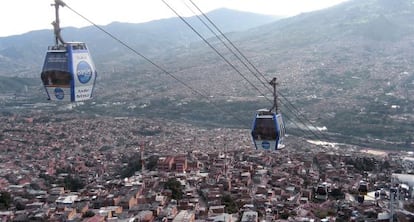UN concerned about Medellín’s growing drug and sex tourism culture
Colombia’s third-largest city attracts foreigners looking to get high and abuse children

An explosive combination of lenient drug controls and sex tourism linked to people trafficking and the exploitation of minors has made Medellín, Colombia’s third-largest city, a prime tourist destination.
The UN Office on Drugs and Crime in Colombia, UNODC, recently released a report following a year-long investigation that points to two specific areas of Medellín -- La Candelabra and El Poled -- which are typically visited by foreigners.
UNODC revealed that tourists select this city for narcotourism, a phenomenon that seduces travelers mainly from the US, Israel, Italy and Germany, because of the high quality of drugs and their low price. But at the same time what makes it even more attractive is the authorities’ light touch, especially with foreigners; people feel comfortable because they are too far away from home for anyone to judge them.
But the drug tourism, which is run by criminal organizations, mixes closely with offers of sexual services and prostitution, most of the time focusing on the sexual exploitation of children and adolescents.
The UNODC says this is a multi-linked business where drug trafficking mingles with other crimes, such as people trafficking and the sexual exploitation of minors. This means that whoever provides the drugs, usually also provides sexual services, said the report which was undertaken along with the Medellín mayor’s office.
“Narcotourism leads to the demand for sexual services. But there is a complete circle where children and adolescents are involved, not only because they are exploited but because they are part of this micro-trafficking chain. They are the ones that supply the sexual abuser with drugs plus they also consume them, whether it is to take part in the [sexual] activity or to gain access to the drug because they are addicts," said Carlos Medina, justice and security chief of UNODC in Colombia, in an interview with EL PAÍS.
As part of the research, officials searched numerous websites that offer tour packages promoting drugs and illegal sexual services. But curiously, these webpages cannot be viewed from Colombia. "They offer catalogs filled with women and instructions on how to gain access to their services," says Medina. They also found numerous blogs where tourists described Medellín as the capital of sex and drugs.
Narcotourism leads to the demand for sexual services”
According to UNODC, many foreigners choose Medellín for this purpose in order to follow the legendary trail left by the late cartel boss Pablo Escobar, who also enjoyed sex with underage girls.
And there is a specific client profile. Both high-end tourists, who visit the city for work or business, as well as backpackers search for that lethal cocktail of sex and drugs, and within that adventure they find multiple offers for sex with minors. Or, at the same time, they just go looking for it.
Tourists also learn of about these offers by the word of mouth on the streets, and in bars and nightclubs. There even exists the so-called “party hostel,” where customers are allowed to consume drugs, especially marijuana. When they come out of these hostels, taxi drivers become their guides to access other services. They are "guides to prostitution houses, information, contacts and drug dealing, as well as the trafficking of children and adolescents who are sexually exploited, and to the places where they can find them," says the study. Usually, taxi drivers receive a commission, amounting to about 10 percent of the final payment, which is the same rate a bellhop or hotel clerk gets when they put the tourist in contact with a pimp. Some hotels also offer photo books with prostitutes, without publishing their ages.
Most of these children have to earn money to support themselves and their families, says the study. According to the Medellín mayor’s Grow with Dignity program, some 274 children have been identified in La Candelaria district, which is located in the center of the city, as being sex workers.
"All the victims identified have said they have been with foreigners, mostly, Spanish, Americans and Mexicans who, according to them, pay the best," says the study.
Medellín has made a huge effort to try to clean up its image and leave behind its notorious past; 20 years ago it was considered one of world’s most dangerous cities.
The UNODC recognizes the efforts made by local authorities to make the city into an international center. In March, Medellín received the title of the world's most innovative city in the City of the Year competition organized by The Wall Street Journal and Citigroup, beating out Tel Aviv and New York.
Tu suscripción se está usando en otro dispositivo
¿Quieres añadir otro usuario a tu suscripción?
Si continúas leyendo en este dispositivo, no se podrá leer en el otro.
FlechaTu suscripción se está usando en otro dispositivo y solo puedes acceder a EL PAÍS desde un dispositivo a la vez.
Si quieres compartir tu cuenta, cambia tu suscripción a la modalidad Premium, así podrás añadir otro usuario. Cada uno accederá con su propia cuenta de email, lo que os permitirá personalizar vuestra experiencia en EL PAÍS.
¿Tienes una suscripción de empresa? Accede aquí para contratar más cuentas.
En el caso de no saber quién está usando tu cuenta, te recomendamos cambiar tu contraseña aquí.
Si decides continuar compartiendo tu cuenta, este mensaje se mostrará en tu dispositivo y en el de la otra persona que está usando tu cuenta de forma indefinida, afectando a tu experiencia de lectura. Puedes consultar aquí los términos y condiciones de la suscripción digital.








































